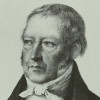“ The will, which constitutes our true being, is of a simple nature; it merely wills, and does not know. ”
Arthur Schopenhauer, The World as Will and Representation (1819). copy citation
| Author | Arthur Schopenhauer |
|---|---|
| Source | The World as Will and Representation |
| Topic | |
| Date | 1819 |
| Language | English |
| Reference | |
| Note | Translated by R. B. Haldane and J. Kemp |
| Weblink | http://www.gutenberg.org/files/40868/40868-h/40868-h.html |
Context
“It is also a result of the fact that only the will, and not the intellect, is indestructible, that all religions and philosophies promise a reward in eternity only to the virtues of the will, or heart, not to those of the intellect, or head.
The following may also serve to illustrate this consideration. The will, which constitutes our true being, is of a simple nature; it merely wills, and does not know. The subject of knowledge, on the other hand, is a secondary phenomenon, arising from the objectification of the will; [pg 296] it is the point of unity of the sensibility of the nervous system, as it were the focus in which the rays of the activity of all the parts of the brain unite.” source
The following may also serve to illustrate this consideration. The will, which constitutes our true being, is of a simple nature; it merely wills, and does not know. The subject of knowledge, on the other hand, is a secondary phenomenon, arising from the objectification of the will; [pg 296] it is the point of unity of the sensibility of the nervous system, as it were the focus in which the rays of the activity of all the parts of the brain unite.” source



